5AG500 Audit & Assurance: Remote Auditing and Professional Ethics
VerifiedAdded on 2023/06/18
|7
|2186
|187
Essay
AI Summary
This essay critically evaluates the effects of remote auditing on an auditor's ability to maintain professional ethics, especially given the challenges posed by the COVID-19 pandemic. It discusses the increased uncertainty in financial reporting, the need for heightened professional skepticism, and the difficulties in gathering sufficient audit evidence remotely. The essay also addresses the benefits of remote auditing, such as cost and time savings, increased efficiency, and reduced auditor burnout. While acknowledging potential drawbacks like reduced involvement and trust issues, the analysis concludes that remote auditing is a crucial and evolving aspect of the audit profession, requiring adaptation and innovation to ensure high-quality audits.
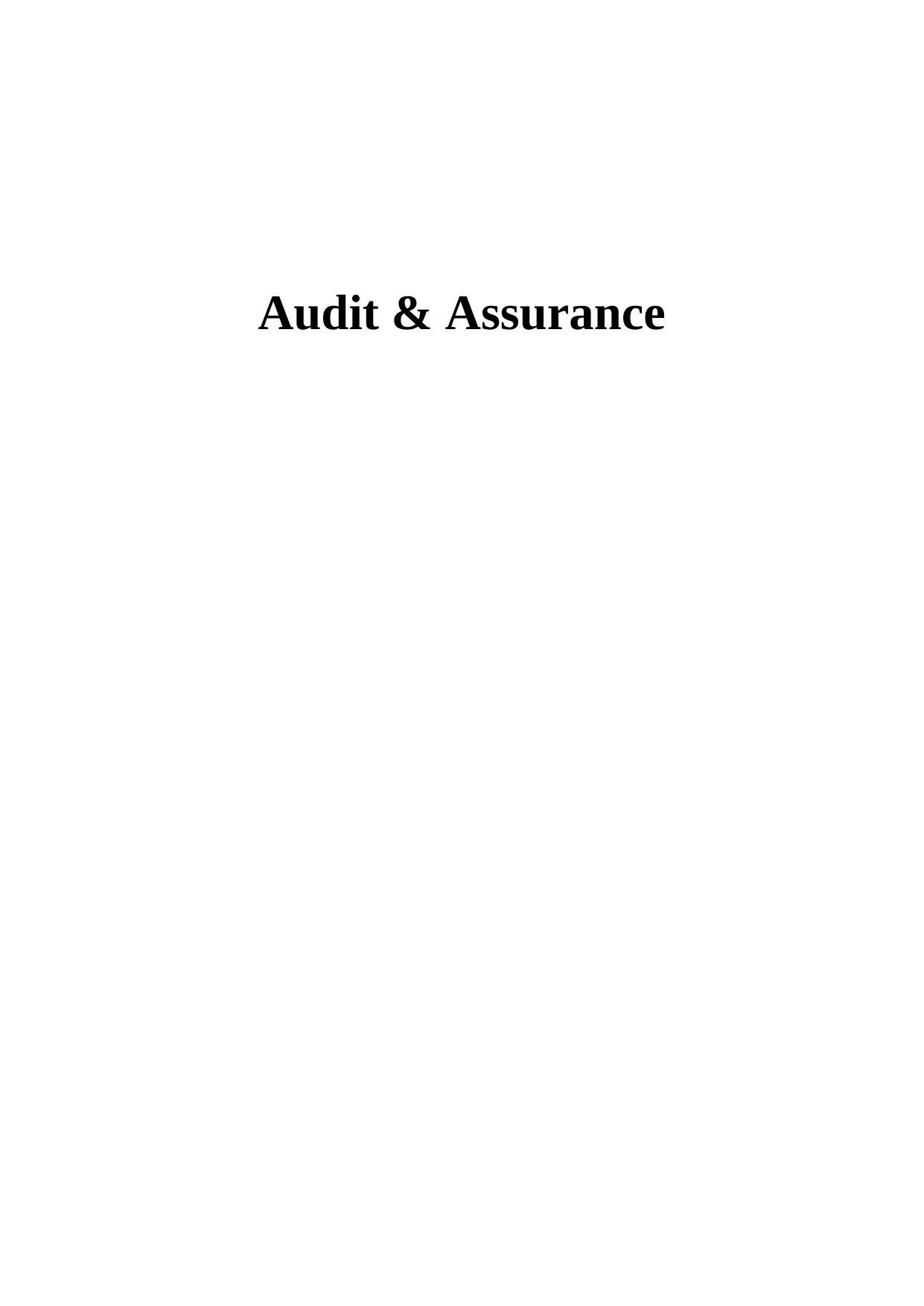
Audit & Assurance
Paraphrase This Document
Need a fresh take? Get an instant paraphrase of this document with our AI Paraphraser
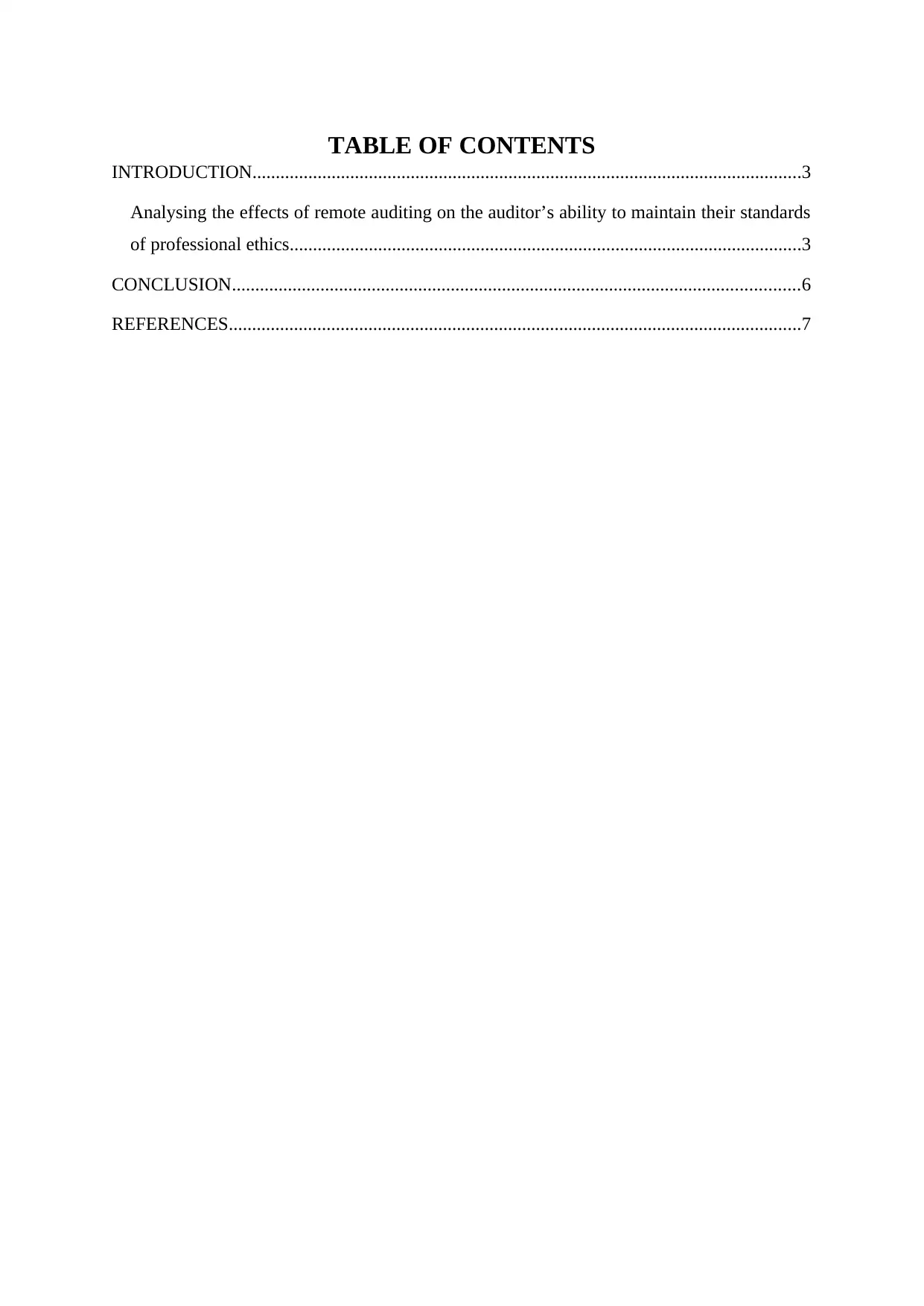
TABLE OF CONTENTS
INTRODUCTION......................................................................................................................3
Analysing the effects of remote auditing on the auditor’s ability to maintain their standards
of professional ethics..............................................................................................................3
CONCLUSION..........................................................................................................................6
REFERENCES...........................................................................................................................7
INTRODUCTION......................................................................................................................3
Analysing the effects of remote auditing on the auditor’s ability to maintain their standards
of professional ethics..............................................................................................................3
CONCLUSION..........................................................................................................................6
REFERENCES...........................................................................................................................7
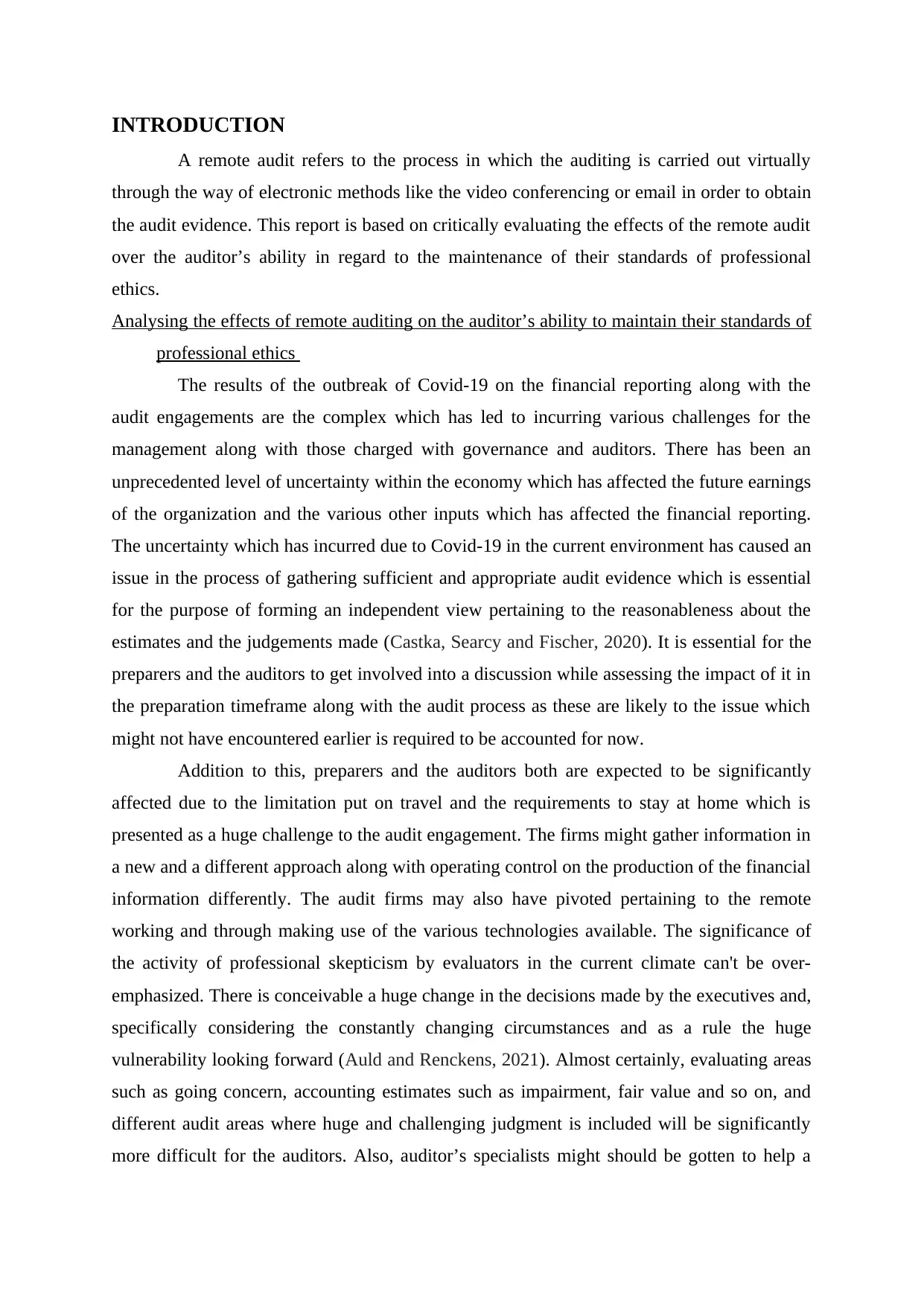
INTRODUCTION
A remote audit refers to the process in which the auditing is carried out virtually
through the way of electronic methods like the video conferencing or email in order to obtain
the audit evidence. This report is based on critically evaluating the effects of the remote audit
over the auditor’s ability in regard to the maintenance of their standards of professional
ethics.
Analysing the effects of remote auditing on the auditor’s ability to maintain their standards of
professional ethics
The results of the outbreak of Covid-19 on the financial reporting along with the
audit engagements are the complex which has led to incurring various challenges for the
management along with those charged with governance and auditors. There has been an
unprecedented level of uncertainty within the economy which has affected the future earnings
of the organization and the various other inputs which has affected the financial reporting.
The uncertainty which has incurred due to Covid-19 in the current environment has caused an
issue in the process of gathering sufficient and appropriate audit evidence which is essential
for the purpose of forming an independent view pertaining to the reasonableness about the
estimates and the judgements made (Castka, Searcy and Fischer, 2020). It is essential for the
preparers and the auditors to get involved into a discussion while assessing the impact of it in
the preparation timeframe along with the audit process as these are likely to the issue which
might not have encountered earlier is required to be accounted for now.
Addition to this, preparers and the auditors both are expected to be significantly
affected due to the limitation put on travel and the requirements to stay at home which is
presented as a huge challenge to the audit engagement. The firms might gather information in
a new and a different approach along with operating control on the production of the financial
information differently. The audit firms may also have pivoted pertaining to the remote
working and through making use of the various technologies available. The significance of
the activity of professional skepticism by evaluators in the current climate can't be over-
emphasized. There is conceivable a huge change in the decisions made by the executives and,
specifically considering the constantly changing circumstances and as a rule the huge
vulnerability looking forward (Auld and Renckens, 2021). Almost certainly, evaluating areas
such as going concern, accounting estimates such as impairment, fair value and so on, and
different audit areas where huge and challenging judgment is included will be significantly
more difficult for the auditors. Also, auditor’s specialists might should be gotten to help a
A remote audit refers to the process in which the auditing is carried out virtually
through the way of electronic methods like the video conferencing or email in order to obtain
the audit evidence. This report is based on critically evaluating the effects of the remote audit
over the auditor’s ability in regard to the maintenance of their standards of professional
ethics.
Analysing the effects of remote auditing on the auditor’s ability to maintain their standards of
professional ethics
The results of the outbreak of Covid-19 on the financial reporting along with the
audit engagements are the complex which has led to incurring various challenges for the
management along with those charged with governance and auditors. There has been an
unprecedented level of uncertainty within the economy which has affected the future earnings
of the organization and the various other inputs which has affected the financial reporting.
The uncertainty which has incurred due to Covid-19 in the current environment has caused an
issue in the process of gathering sufficient and appropriate audit evidence which is essential
for the purpose of forming an independent view pertaining to the reasonableness about the
estimates and the judgements made (Castka, Searcy and Fischer, 2020). It is essential for the
preparers and the auditors to get involved into a discussion while assessing the impact of it in
the preparation timeframe along with the audit process as these are likely to the issue which
might not have encountered earlier is required to be accounted for now.
Addition to this, preparers and the auditors both are expected to be significantly
affected due to the limitation put on travel and the requirements to stay at home which is
presented as a huge challenge to the audit engagement. The firms might gather information in
a new and a different approach along with operating control on the production of the financial
information differently. The audit firms may also have pivoted pertaining to the remote
working and through making use of the various technologies available. The significance of
the activity of professional skepticism by evaluators in the current climate can't be over-
emphasized. There is conceivable a huge change in the decisions made by the executives and,
specifically considering the constantly changing circumstances and as a rule the huge
vulnerability looking forward (Auld and Renckens, 2021). Almost certainly, evaluating areas
such as going concern, accounting estimates such as impairment, fair value and so on, and
different audit areas where huge and challenging judgment is included will be significantly
more difficult for the auditors. Also, auditor’s specialists might should be gotten to help a
⊘ This is a preview!⊘
Do you want full access?
Subscribe today to unlock all pages.

Trusted by 1+ million students worldwide
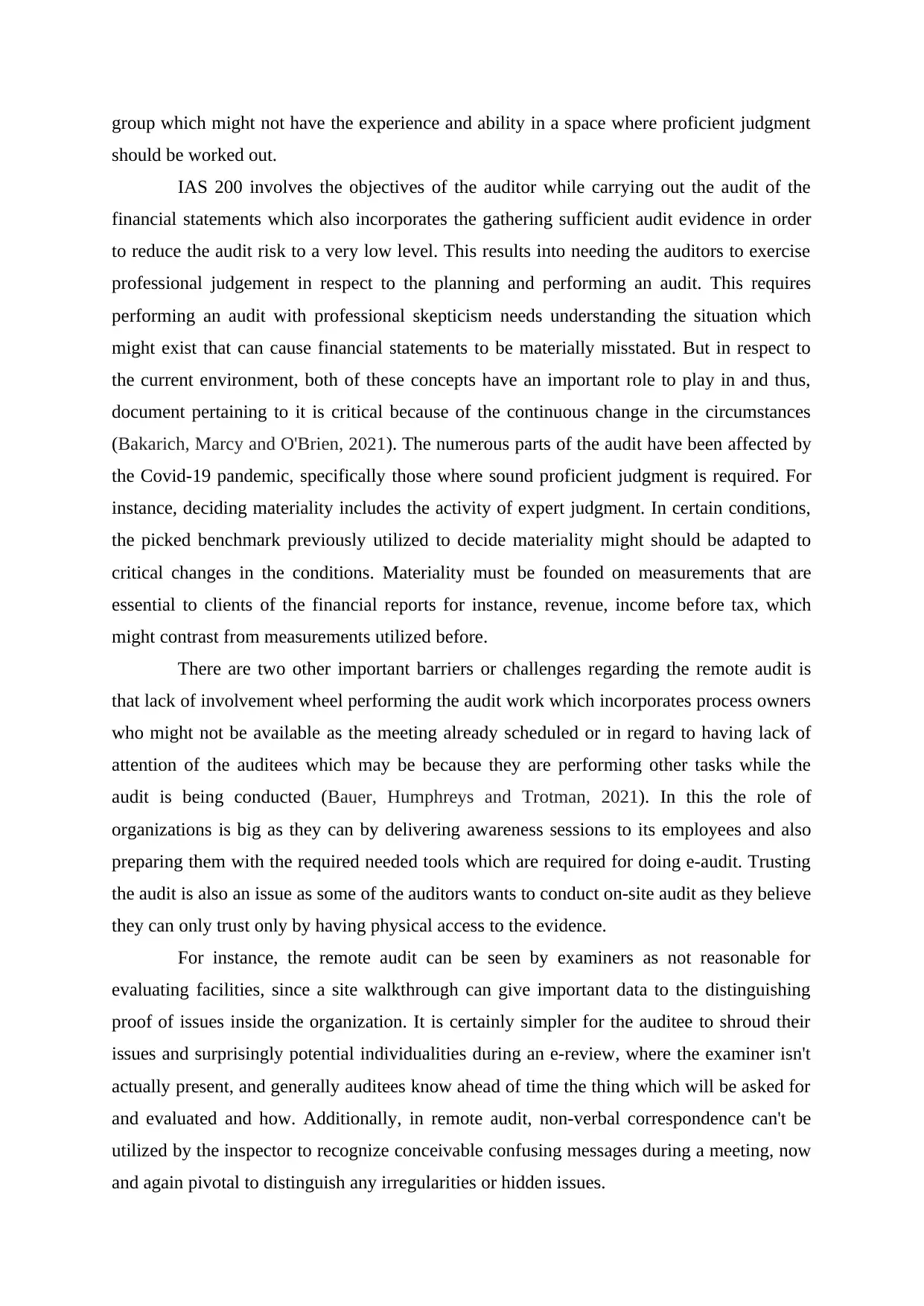
group which might not have the experience and ability in a space where proficient judgment
should be worked out.
IAS 200 involves the objectives of the auditor while carrying out the audit of the
financial statements which also incorporates the gathering sufficient audit evidence in order
to reduce the audit risk to a very low level. This results into needing the auditors to exercise
professional judgement in respect to the planning and performing an audit. This requires
performing an audit with professional skepticism needs understanding the situation which
might exist that can cause financial statements to be materially misstated. But in respect to
the current environment, both of these concepts have an important role to play in and thus,
document pertaining to it is critical because of the continuous change in the circumstances
(Bakarich, Marcy and O'Brien, 2021). The numerous parts of the audit have been affected by
the Covid-19 pandemic, specifically those where sound proficient judgment is required. For
instance, deciding materiality includes the activity of expert judgment. In certain conditions,
the picked benchmark previously utilized to decide materiality might should be adapted to
critical changes in the conditions. Materiality must be founded on measurements that are
essential to clients of the financial reports for instance, revenue, income before tax, which
might contrast from measurements utilized before.
There are two other important barriers or challenges regarding the remote audit is
that lack of involvement wheel performing the audit work which incorporates process owners
who might not be available as the meeting already scheduled or in regard to having lack of
attention of the auditees which may be because they are performing other tasks while the
audit is being conducted (Bauer, Humphreys and Trotman, 2021). In this the role of
organizations is big as they can by delivering awareness sessions to its employees and also
preparing them with the required needed tools which are required for doing e-audit. Trusting
the audit is also an issue as some of the auditors wants to conduct on-site audit as they believe
they can only trust only by having physical access to the evidence.
For instance, the remote audit can be seen by examiners as not reasonable for
evaluating facilities, since a site walkthrough can give important data to the distinguishing
proof of issues inside the organization. It is certainly simpler for the auditee to shroud their
issues and surprisingly potential individualities during an e-review, where the examiner isn't
actually present, and generally auditees know ahead of time the thing which will be asked for
and evaluated and how. Additionally, in remote audit, non-verbal correspondence can't be
utilized by the inspector to recognize conceivable confusing messages during a meeting, now
and again pivotal to distinguish any irregularities or hidden issues.
should be worked out.
IAS 200 involves the objectives of the auditor while carrying out the audit of the
financial statements which also incorporates the gathering sufficient audit evidence in order
to reduce the audit risk to a very low level. This results into needing the auditors to exercise
professional judgement in respect to the planning and performing an audit. This requires
performing an audit with professional skepticism needs understanding the situation which
might exist that can cause financial statements to be materially misstated. But in respect to
the current environment, both of these concepts have an important role to play in and thus,
document pertaining to it is critical because of the continuous change in the circumstances
(Bakarich, Marcy and O'Brien, 2021). The numerous parts of the audit have been affected by
the Covid-19 pandemic, specifically those where sound proficient judgment is required. For
instance, deciding materiality includes the activity of expert judgment. In certain conditions,
the picked benchmark previously utilized to decide materiality might should be adapted to
critical changes in the conditions. Materiality must be founded on measurements that are
essential to clients of the financial reports for instance, revenue, income before tax, which
might contrast from measurements utilized before.
There are two other important barriers or challenges regarding the remote audit is
that lack of involvement wheel performing the audit work which incorporates process owners
who might not be available as the meeting already scheduled or in regard to having lack of
attention of the auditees which may be because they are performing other tasks while the
audit is being conducted (Bauer, Humphreys and Trotman, 2021). In this the role of
organizations is big as they can by delivering awareness sessions to its employees and also
preparing them with the required needed tools which are required for doing e-audit. Trusting
the audit is also an issue as some of the auditors wants to conduct on-site audit as they believe
they can only trust only by having physical access to the evidence.
For instance, the remote audit can be seen by examiners as not reasonable for
evaluating facilities, since a site walkthrough can give important data to the distinguishing
proof of issues inside the organization. It is certainly simpler for the auditee to shroud their
issues and surprisingly potential individualities during an e-review, where the examiner isn't
actually present, and generally auditees know ahead of time the thing which will be asked for
and evaluated and how. Additionally, in remote audit, non-verbal correspondence can't be
utilized by the inspector to recognize conceivable confusing messages during a meeting, now
and again pivotal to distinguish any irregularities or hidden issues.
Paraphrase This Document
Need a fresh take? Get an instant paraphrase of this document with our AI Paraphraser
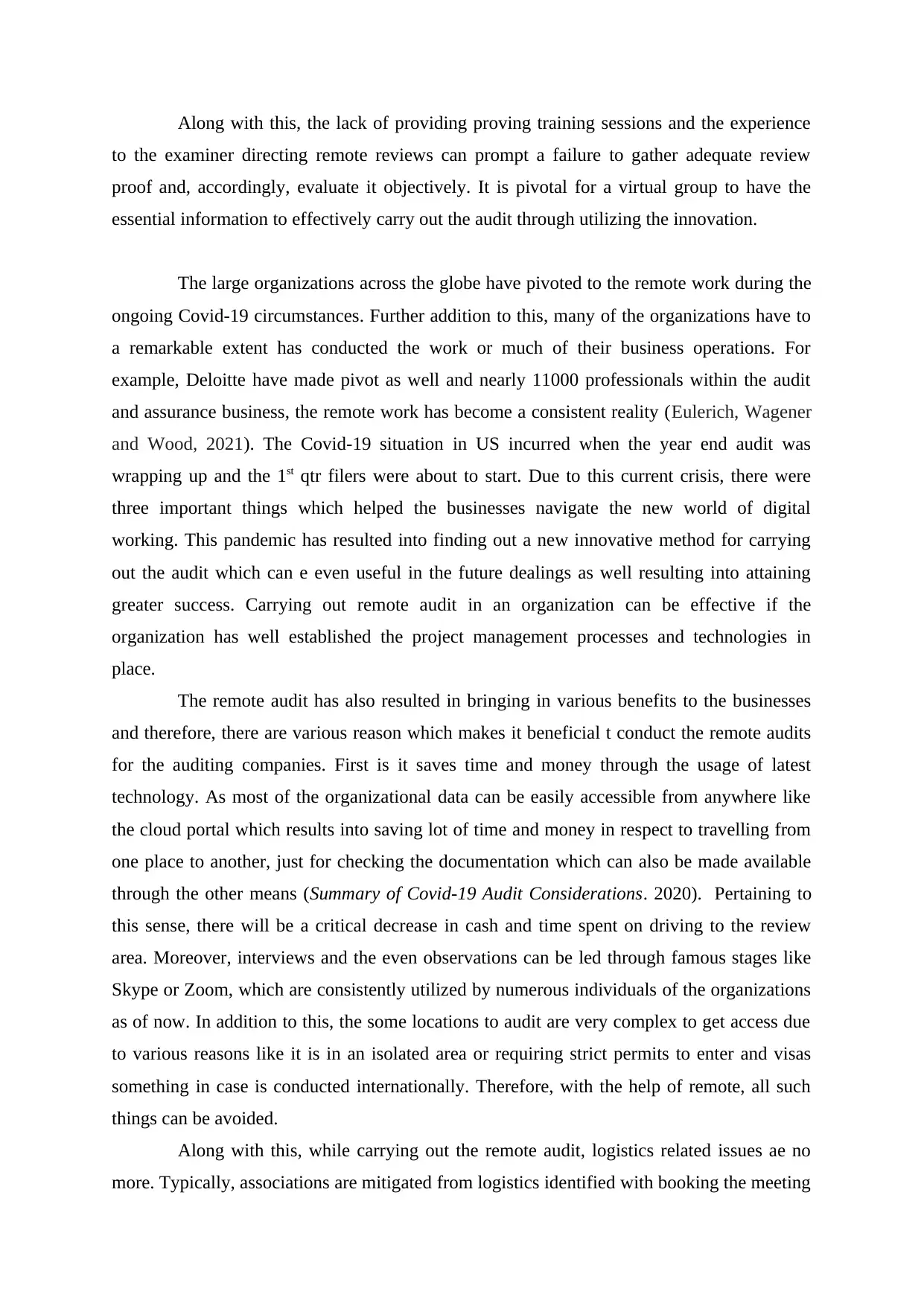
Along with this, the lack of providing proving training sessions and the experience
to the examiner directing remote reviews can prompt a failure to gather adequate review
proof and, accordingly, evaluate it objectively. It is pivotal for a virtual group to have the
essential information to effectively carry out the audit through utilizing the innovation.
The large organizations across the globe have pivoted to the remote work during the
ongoing Covid-19 circumstances. Further addition to this, many of the organizations have to
a remarkable extent has conducted the work or much of their business operations. For
example, Deloitte have made pivot as well and nearly 11000 professionals within the audit
and assurance business, the remote work has become a consistent reality (Eulerich, Wagener
and Wood, 2021). The Covid-19 situation in US incurred when the year end audit was
wrapping up and the 1st qtr filers were about to start. Due to this current crisis, there were
three important things which helped the businesses navigate the new world of digital
working. This pandemic has resulted into finding out a new innovative method for carrying
out the audit which can e even useful in the future dealings as well resulting into attaining
greater success. Carrying out remote audit in an organization can be effective if the
organization has well established the project management processes and technologies in
place.
The remote audit has also resulted in bringing in various benefits to the businesses
and therefore, there are various reason which makes it beneficial t conduct the remote audits
for the auditing companies. First is it saves time and money through the usage of latest
technology. As most of the organizational data can be easily accessible from anywhere like
the cloud portal which results into saving lot of time and money in respect to travelling from
one place to another, just for checking the documentation which can also be made available
through the other means (Summary of Covid-19 Audit Considerations. 2020). Pertaining to
this sense, there will be a critical decrease in cash and time spent on driving to the review
area. Moreover, interviews and the even observations can be led through famous stages like
Skype or Zoom, which are consistently utilized by numerous individuals of the organizations
as of now. In addition to this, the some locations to audit are very complex to get access due
to various reasons like it is in an isolated area or requiring strict permits to enter and visas
something in case is conducted internationally. Therefore, with the help of remote, all such
things can be avoided.
Along with this, while carrying out the remote audit, logistics related issues ae no
more. Typically, associations are mitigated from logistics identified with booking the meeting
to the examiner directing remote reviews can prompt a failure to gather adequate review
proof and, accordingly, evaluate it objectively. It is pivotal for a virtual group to have the
essential information to effectively carry out the audit through utilizing the innovation.
The large organizations across the globe have pivoted to the remote work during the
ongoing Covid-19 circumstances. Further addition to this, many of the organizations have to
a remarkable extent has conducted the work or much of their business operations. For
example, Deloitte have made pivot as well and nearly 11000 professionals within the audit
and assurance business, the remote work has become a consistent reality (Eulerich, Wagener
and Wood, 2021). The Covid-19 situation in US incurred when the year end audit was
wrapping up and the 1st qtr filers were about to start. Due to this current crisis, there were
three important things which helped the businesses navigate the new world of digital
working. This pandemic has resulted into finding out a new innovative method for carrying
out the audit which can e even useful in the future dealings as well resulting into attaining
greater success. Carrying out remote audit in an organization can be effective if the
organization has well established the project management processes and technologies in
place.
The remote audit has also resulted in bringing in various benefits to the businesses
and therefore, there are various reason which makes it beneficial t conduct the remote audits
for the auditing companies. First is it saves time and money through the usage of latest
technology. As most of the organizational data can be easily accessible from anywhere like
the cloud portal which results into saving lot of time and money in respect to travelling from
one place to another, just for checking the documentation which can also be made available
through the other means (Summary of Covid-19 Audit Considerations. 2020). Pertaining to
this sense, there will be a critical decrease in cash and time spent on driving to the review
area. Moreover, interviews and the even observations can be led through famous stages like
Skype or Zoom, which are consistently utilized by numerous individuals of the organizations
as of now. In addition to this, the some locations to audit are very complex to get access due
to various reasons like it is in an isolated area or requiring strict permits to enter and visas
something in case is conducted internationally. Therefore, with the help of remote, all such
things can be avoided.
Along with this, while carrying out the remote audit, logistics related issues ae no
more. Typically, associations are mitigated from logistics identified with booking the meeting
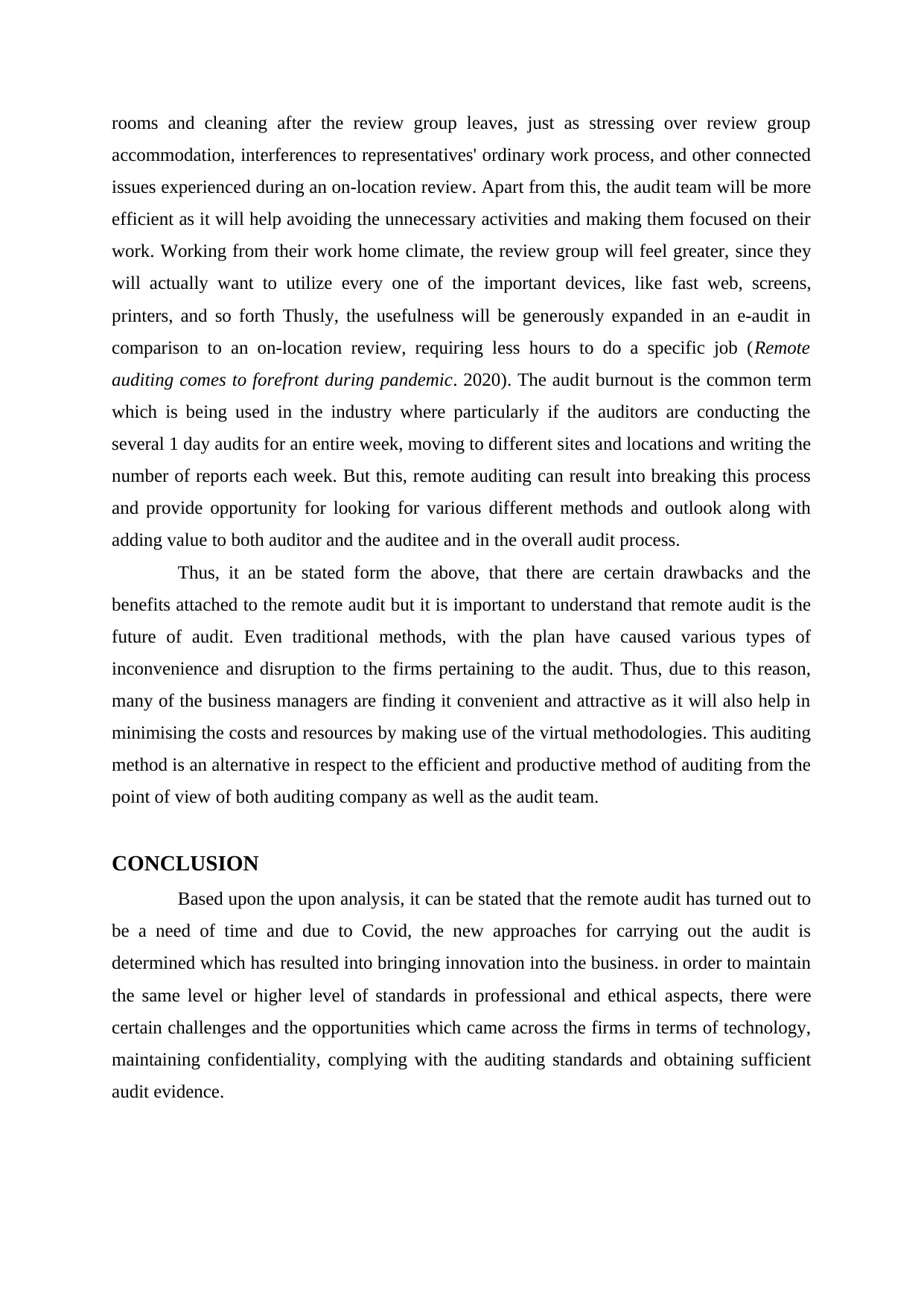
rooms and cleaning after the review group leaves, just as stressing over review group
accommodation, interferences to representatives' ordinary work process, and other connected
issues experienced during an on-location review. Apart from this, the audit team will be more
efficient as it will help avoiding the unnecessary activities and making them focused on their
work. Working from their work home climate, the review group will feel greater, since they
will actually want to utilize every one of the important devices, like fast web, screens,
printers, and so forth Thusly, the usefulness will be generously expanded in an e-audit in
comparison to an on-location review, requiring less hours to do a specific job (Remote
auditing comes to forefront during pandemic. 2020). The audit burnout is the common term
which is being used in the industry where particularly if the auditors are conducting the
several 1 day audits for an entire week, moving to different sites and locations and writing the
number of reports each week. But this, remote auditing can result into breaking this process
and provide opportunity for looking for various different methods and outlook along with
adding value to both auditor and the auditee and in the overall audit process.
Thus, it an be stated form the above, that there are certain drawbacks and the
benefits attached to the remote audit but it is important to understand that remote audit is the
future of audit. Even traditional methods, with the plan have caused various types of
inconvenience and disruption to the firms pertaining to the audit. Thus, due to this reason,
many of the business managers are finding it convenient and attractive as it will also help in
minimising the costs and resources by making use of the virtual methodologies. This auditing
method is an alternative in respect to the efficient and productive method of auditing from the
point of view of both auditing company as well as the audit team.
CONCLUSION
Based upon the upon analysis, it can be stated that the remote audit has turned out to
be a need of time and due to Covid, the new approaches for carrying out the audit is
determined which has resulted into bringing innovation into the business. in order to maintain
the same level or higher level of standards in professional and ethical aspects, there were
certain challenges and the opportunities which came across the firms in terms of technology,
maintaining confidentiality, complying with the auditing standards and obtaining sufficient
audit evidence.
accommodation, interferences to representatives' ordinary work process, and other connected
issues experienced during an on-location review. Apart from this, the audit team will be more
efficient as it will help avoiding the unnecessary activities and making them focused on their
work. Working from their work home climate, the review group will feel greater, since they
will actually want to utilize every one of the important devices, like fast web, screens,
printers, and so forth Thusly, the usefulness will be generously expanded in an e-audit in
comparison to an on-location review, requiring less hours to do a specific job (Remote
auditing comes to forefront during pandemic. 2020). The audit burnout is the common term
which is being used in the industry where particularly if the auditors are conducting the
several 1 day audits for an entire week, moving to different sites and locations and writing the
number of reports each week. But this, remote auditing can result into breaking this process
and provide opportunity for looking for various different methods and outlook along with
adding value to both auditor and the auditee and in the overall audit process.
Thus, it an be stated form the above, that there are certain drawbacks and the
benefits attached to the remote audit but it is important to understand that remote audit is the
future of audit. Even traditional methods, with the plan have caused various types of
inconvenience and disruption to the firms pertaining to the audit. Thus, due to this reason,
many of the business managers are finding it convenient and attractive as it will also help in
minimising the costs and resources by making use of the virtual methodologies. This auditing
method is an alternative in respect to the efficient and productive method of auditing from the
point of view of both auditing company as well as the audit team.
CONCLUSION
Based upon the upon analysis, it can be stated that the remote audit has turned out to
be a need of time and due to Covid, the new approaches for carrying out the audit is
determined which has resulted into bringing innovation into the business. in order to maintain
the same level or higher level of standards in professional and ethical aspects, there were
certain challenges and the opportunities which came across the firms in terms of technology,
maintaining confidentiality, complying with the auditing standards and obtaining sufficient
audit evidence.
⊘ This is a preview!⊘
Do you want full access?
Subscribe today to unlock all pages.

Trusted by 1+ million students worldwide
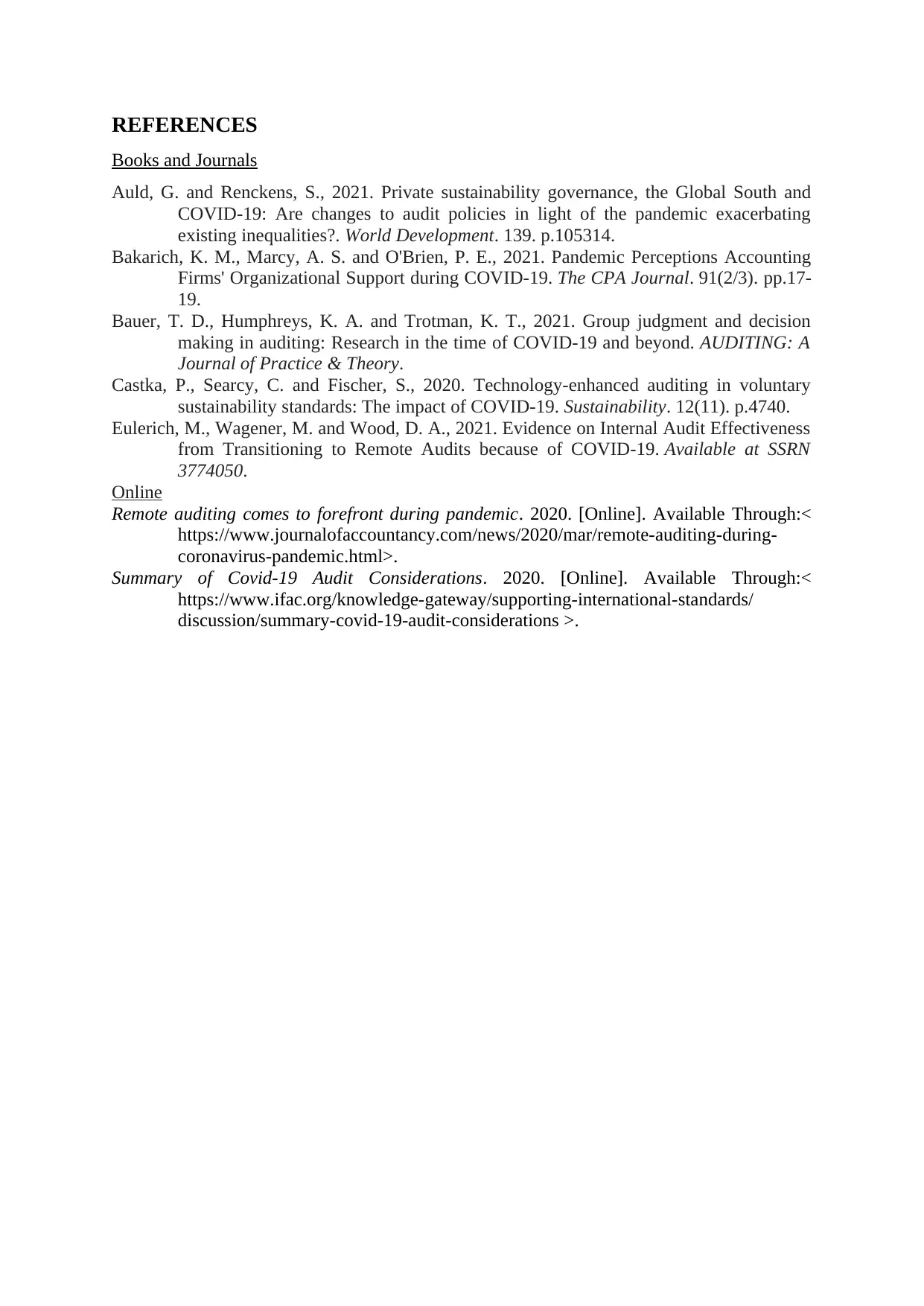
REFERENCES
Books and Journals
Auld, G. and Renckens, S., 2021. Private sustainability governance, the Global South and
COVID-19: Are changes to audit policies in light of the pandemic exacerbating
existing inequalities?. World Development. 139. p.105314.
Bakarich, K. M., Marcy, A. S. and O'Brien, P. E., 2021. Pandemic Perceptions Accounting
Firms' Organizational Support during COVID-19. The CPA Journal. 91(2/3). pp.17-
19.
Bauer, T. D., Humphreys, K. A. and Trotman, K. T., 2021. Group judgment and decision
making in auditing: Research in the time of COVID-19 and beyond. AUDITING: A
Journal of Practice & Theory.
Castka, P., Searcy, C. and Fischer, S., 2020. Technology-enhanced auditing in voluntary
sustainability standards: The impact of COVID-19. Sustainability. 12(11). p.4740.
Eulerich, M., Wagener, M. and Wood, D. A., 2021. Evidence on Internal Audit Effectiveness
from Transitioning to Remote Audits because of COVID-19. Available at SSRN
3774050.
Online
Remote auditing comes to forefront during pandemic. 2020. [Online]. Available Through:<
https://www.journalofaccountancy.com/news/2020/mar/remote-auditing-during-
coronavirus-pandemic.html>.
Summary of Covid-19 Audit Considerations. 2020. [Online]. Available Through:<
https://www.ifac.org/knowledge-gateway/supporting-international-standards/
discussion/summary-covid-19-audit-considerations >.
Books and Journals
Auld, G. and Renckens, S., 2021. Private sustainability governance, the Global South and
COVID-19: Are changes to audit policies in light of the pandemic exacerbating
existing inequalities?. World Development. 139. p.105314.
Bakarich, K. M., Marcy, A. S. and O'Brien, P. E., 2021. Pandemic Perceptions Accounting
Firms' Organizational Support during COVID-19. The CPA Journal. 91(2/3). pp.17-
19.
Bauer, T. D., Humphreys, K. A. and Trotman, K. T., 2021. Group judgment and decision
making in auditing: Research in the time of COVID-19 and beyond. AUDITING: A
Journal of Practice & Theory.
Castka, P., Searcy, C. and Fischer, S., 2020. Technology-enhanced auditing in voluntary
sustainability standards: The impact of COVID-19. Sustainability. 12(11). p.4740.
Eulerich, M., Wagener, M. and Wood, D. A., 2021. Evidence on Internal Audit Effectiveness
from Transitioning to Remote Audits because of COVID-19. Available at SSRN
3774050.
Online
Remote auditing comes to forefront during pandemic. 2020. [Online]. Available Through:<
https://www.journalofaccountancy.com/news/2020/mar/remote-auditing-during-
coronavirus-pandemic.html>.
Summary of Covid-19 Audit Considerations. 2020. [Online]. Available Through:<
https://www.ifac.org/knowledge-gateway/supporting-international-standards/
discussion/summary-covid-19-audit-considerations >.
1 out of 7
Related Documents
Your All-in-One AI-Powered Toolkit for Academic Success.
+13062052269
info@desklib.com
Available 24*7 on WhatsApp / Email
![[object Object]](/_next/static/media/star-bottom.7253800d.svg)
Unlock your academic potential
Copyright © 2020–2026 A2Z Services. All Rights Reserved. Developed and managed by ZUCOL.




